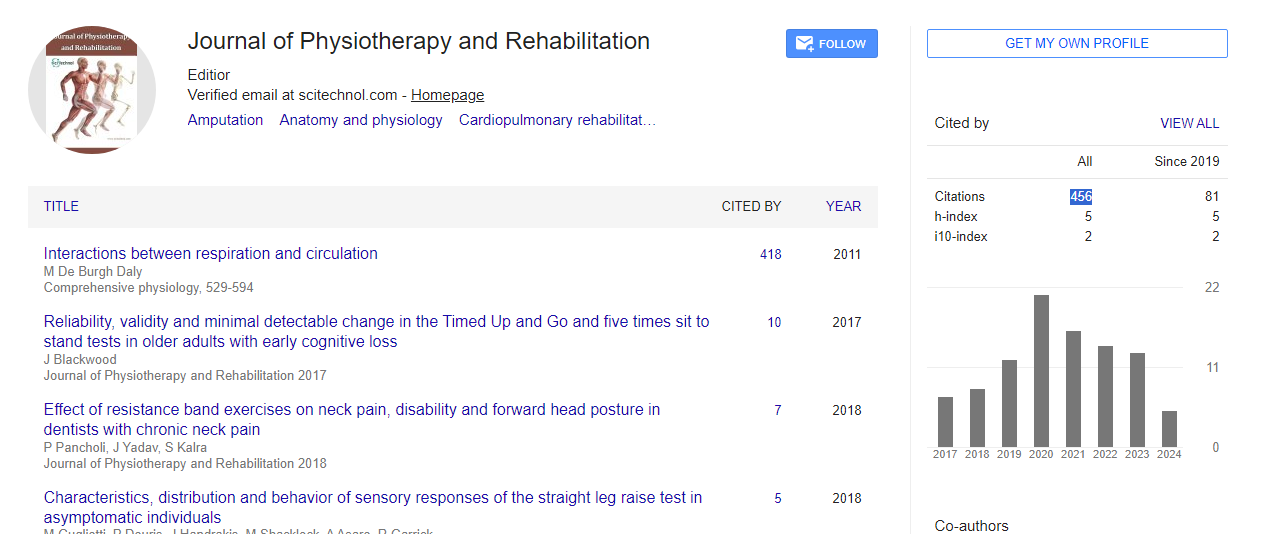Opinion Article, J Physiother Rehabi Vol: 7 Issue: 5
Physiotherapy and the Synergistic Impact of Clinical Psychologists
Cowan Flavie*
1Department of Physiotherapy, The University of Newcastle, Callaghan, Australia
*Corresponding Author: Cowan Flavie,
Department of Physiotherapy, The
University of Newcastle, Callaghan, Australia
E-mail: cowaflav@newcastle.edu.au
Received date: 24 September, 2023, Manuscript No. JPTR-23-121680;
Editor assigned date: 27 September, 2023, PreQC No. JPTR-23-121680 (PQ);
Reviewed date: 11 October, 2023, QC No. JPTR-23-121680;
Revised date: 18 October, 2023, Manuscript No. JPTR-23-121680 (R);
Published date: 25 October, 2023, DOI: 10.4172/JPTR.1000157
Citation: Flavie C (2023) Physiotherapy and the Synergistic Impact of Clinical Psychologists. J Physiother Rehabi 7:5.
Description
Physiotherapy, a dynamic and multidimensional approach to rehabilitation, addresses the physical aspects of injuries and conditions, aiming to restore function and improve quality of life. While traditionally focused on the human body mechanics, the integration of clinical psychologists into physiotherapeutic care has revealed an extensive understanding of the interconnectedness between mental and physical well-being.
Clinical psychologists play a pivotal role in enhancing the overall impact of physiotherapy by addressing the psychological dimensions of patients' experiences. Physiotherapy interventions are important for rebuilding strength, improving flexibility and restoring mobility. However, the psychological toll of the injury, such as fear, anxiety or depression, can impede the progress of physical recovery.
One fundamental aspect where clinical psychologists contribute is in pain management. Chronic pain is a complex phenomenon influenced by both physical and psychological factors. Physiotherapists employ various techniques to address the physical aspect of pain, but the emotional and cognitive aspects are equally significant. Clinical psychologists specialize in understanding the psychological components of pain, helping patients develop adaptive techniques, manage stress and improve their overall pain tolerance.
The collaboration between physiotherapists and clinical psychologists is instrumental in fostering resilience among patients. Rehabilitation often involves facing challenges, setbacks and the need for consistent effort. Clinical psychologists provide valuable assistance in developing mental resilience, helping individuals navigate the emotional hurdles associated with the rehabilitation journey. This not only enhances the effectiveness of physiotherapy but also contributes to the long-term well-being of the patient.
The chronic conditions or disabilities, such as those encountered in neurological rehabilitation, the role of clinical psychologists becomes even more pronounced. Individuals adapting to a new norm may experience a range of emotions, including grief, frustration or a sense of loss. Clinical psychologists guide patients through the psychological adjustments, facilitating acceptance and empowering them to find new ways to derive meaning and satisfaction from life.
The psychosocial impact of physiotherapy extends beyond the patient to encompass their support network. Clinical psychologists collaborate with physiotherapists to engage with families, providing strategies for effective communication and ensuring a comprehensive approach to rehabilitation that considers the broader social context.
The mind-body connection is particularly evident in conditions where stress and mental health significantly impact physical symptoms. For instance, in conditions like fibromyalgia or tensionrelated disorders, the integration of psychological support is integral to comprehensive care. Clinical psychologists, collaborating with physiotherapists, explore stressors, teach relaxation techniques and help patients manage the emotional aspects of their conditions, contributing to a more effective treatment plan.
Moreover, patient adherence to physiotherapy exercises and lifestyle modifications is often influenced by psychological factors. Clinical psychologists collaborate with physiotherapists to identify potential barriers and develop strategies to enhance motivation and compliance. This synergistic approach ensures that the prescribed interventions are not only beneficial physically but also align with the patient's mental and emotional needs.
Conclusion
The integration of clinical psychologists into physiotherapeutic care represents a paradigm shift towards a more comprehensive approach to rehabilitation. This collaboration recognizes that optimal health and recovery require addressing not only the physical symptoms but also the complex interaction between psychological and emotional factors. The physiotherapists and clinical psychologists provide a therapeutic alliance that not only accelerates recovery but also nurtures the mental resilience essential for sustained well-being.
 Spanish
Spanish  Chinese
Chinese  Russian
Russian  German
German  French
French  Japanese
Japanese  Portuguese
Portuguese  Hindi
Hindi 